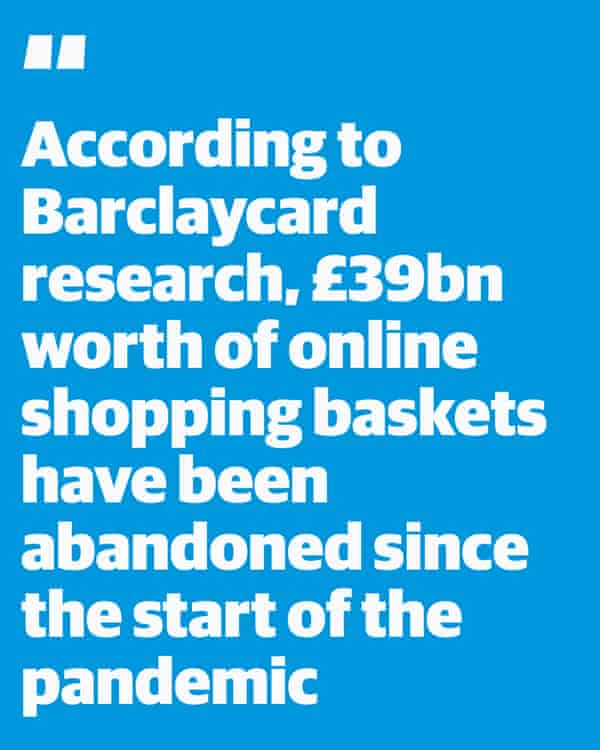
The retail industry has undergone a radical transformation. Even before the Covid pandemic, the shift to e-commerce was completely reshaping how the industry operates and how customers shop.
But lockdowns made these shifts more rapid and seismic, forcing businesses and consumers to shop online at record levels. The pandemic also expedited the adoption of in-store contactless payments. Research from UK Finance, which represents the banking and finance industry, found that 27% of all payments in 2020 were contactless, up from 7% five years ago.

While people have been talking about the shift to e-commerce for decades, we are now getting a much more definitive and enduring sense of what that transformation actually looks like, and what it means for retail businesses.
“Finally, cash is no longer king,” says Jacob Rider, senior programme manager at Projective, a financial business, technology and innovation consulting firm. “Notes and coins went out of widespread use during the pandemic, while payments innovation in the contactless space – and the relaxing of regulations allowing the upping of limits – means digital and contactless payment with card or phone, or wear[able] tech, is now the preferred method of payment for many.”
This means that trust is now of paramount importance – for both retailers and consumers alike. “Businesses are frantically working on recovering from the pandemic disruption, and they need to instil trust,” says Harshna Cayley, managing director, gateway products at Barclaycard Business. “Comfort and security is top of mind for a range of businesses, whether large or small.”
Another effect of these trends is the way physical and online retail shopping have increasingly blended into one experience. However customers choose to shop, they expect the benefits of both approaches. For instance, some might wish to order online and then pick up in store, or they want to try out products in store and then have the purchase fulfilled online.

Alternatively, they might expect their in-person shopping experiences to be more personalised. Retailers have often found themselves having to shapeshift in response to this demand for seamlessness and ease – and key to this are so-called omnichannel payments systems, which allow retailers to offer near-frictionless online payments regardless of whether customers are shopping in person, online or via mobile.
Analysts suggest that the ability to offer frictionless payments is critical in business. “A flawless digital experience is now required to compete,” says Rider. “Brands need to innovate again if they want a customer payments experience advantage.”
For example, regardless of how smoothly a customer progresses on their e-commerce purchasing journey – browsing, comparing and choosing an item – it is likely to come to a shuddering halt if the payment experience is challenging.
According to Barclaycard research, £39bn worth of online shopping baskets have been abandoned since the start of the pandemic. Typical reasons for customers abandoning their cart include delivery fees, concerns about cybersecurity, and the absence of their chosen payment method.
These stats don’t surprise Nick Maynard, head of research at Juniper Research, which specialises in financial and payment technologies. “Generally, friction is the main reason for cart abandonment,” he says. “This can come in many shapes or forms, including the inability to use a preferred payment method, poor design, or onerous security steps.”

According to Cayley, a robust payment gateway is crucial for online retailers. A payment gateway is essentially a communication layer that sends payment information securely from the acquirer to the customer’s issuing bank, and back again. “Barclaycard payment gateway seamlessly connects the customer’s website with our payment system,” she says. “Then it securely captures and encrypts transactions, passing the necessary information between the end customer, the merchant, and the acquiring bank.”
She notes that Barclaycard payment gateway is easy to integrate and scales depending on business needs, adding that it can improve the customer experience while helping companies comply with regulations and meet their legal obligations.
Recent global events have brought into focus other shifts in the e-commerce landscape, such as the entry of more manufacturers into the direct-to-consumer retail space. Likewise, international sales have become an increasingly important way for retailers to plug the gaps left by supply chain problems and the decline of bricks and mortar trading.
In a sense, omnichannel payments are evolving into omnipresent experiences and, as such, we can expect further rapid developments in this space, according to Jeroen Hölscher, head of global payments and cards practice at Capgemini, an IT services and consulting company. “Customers and businesses are undergoing a radical shift to digital wallets, mobile payments, virtual cards and other advanced payment solutions, which offer feature-rich, hyper-personalised digital payments experience,” he says. “Already, digital wallets are one of the most preferred payment methods for e-commerce purchases. Global e-commerce market sales are predicted to surpass $7tn (£5tn) by 2024, and digital wallets are expected to account for more than 50% of all the e-commerce payments.”
More recently, e-commerce merchants were once again buoyed up by Black Friday last year, with the number of payments made via Barclaycard up by 23% between midnight and 5pm compared with the same period in 2020, and up 2.4% on 2019.
“The prize for retailers is huge, with the bounce-back of the economy and consumers looking to spend,” says Cayley. “There is a massive opportunity to drive e-commerce.”
Find out how your business can benefit from quick and frictionless online payments here